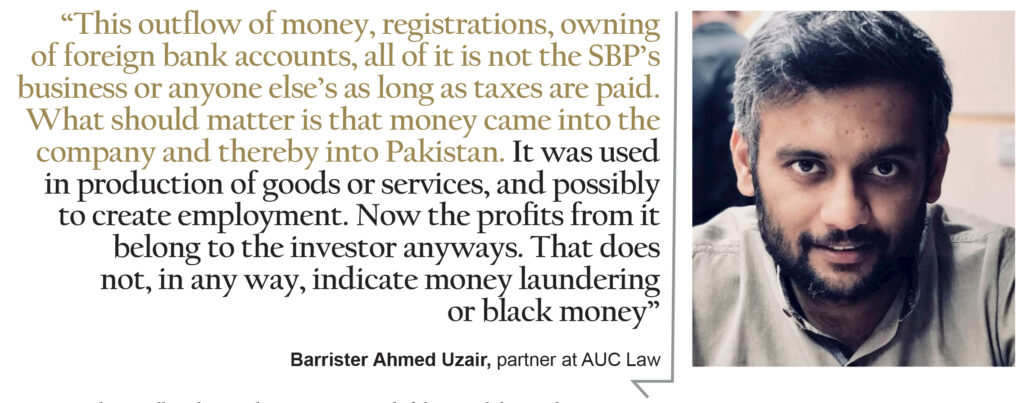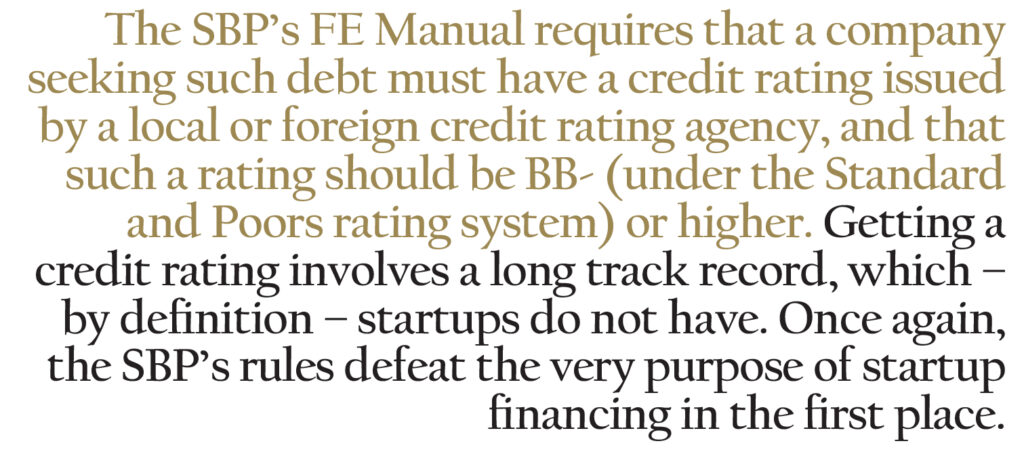Creating a legitimate company in Pakistan – one completely registered and intending to follow all laws and pay all taxes – involves begging and pleading with several layers of bureaucrats, over and over again, with duplicates, triplicates, and quadruplicates of every single document in hand, duly attested by the highest and most noble of civil servants, for the simple permission to breathe.
Yes, trying to create a company in Pakistan involves asking for permission for things that one finds oneself astonished even need permission for to begin with. This is a problem bad enough for large companies in mature industries, but is exacerbated when it involves young entrepreneurs, cash-strapped startups, in newly evolving industries where moving fast is essential for survival.
Yet despite all the complaining and frustration involved, there is also an undeniable fact: the government of Pakistan has turned out to be surprisingly responsive to the evolving needs of the country’s startup ecosystem, particularly the independent regulators like the Securities and Exchanges Commission of Pakistan (SECP), which introduced a new 2020 Companies (Amendment) Ordinance with considerable input from private sector stakeholders addressed many of their concerns.
That responsiveness on the part of the SECP has led many to hope that the State Bank of Pakistan (SBP) will be similarly responsive in making regulatory changes that could help the country’s still-nascent startup ecosystem. As helpful as the SECP’s proposed changes are, they mostly deal with concerns of industrial companies. But many of the regulatory hurdles that directly affect startups have to do with the SBP and the Federal Board of Revenue (FBR), the former of which is seen as a more responsive institution where there can be hope for favourable reforms.
Indeed, a group of four young lawyers has done more than just hope for change: they have taken it upon themselves to draft a set of proposed changes to existing State Bank regulations that most directly affect startups, and are now working with officials at the SBP in the hopes of getting a favourable review of their proposals.
The four lawyers in question are Barrister Ahmed Uzair, a partner at AUC-Law, a corporate law firm based in Lahore, Zahra Abid, a partner at the Karachi-based Haidermota & Company, one of Pakistan’s most respected law firms, Mubariz Siddqui, general counsel at Sarmayacar, the largest professionally managed Pakistan-focused venture capital fund, and Barrister Taimur Malik, a Dubai-based partner at Clyde & Company, the London-based global law firm.
At the heart of their proposals are the current provisions of of the Foreign Exchange Act, 1947. However, this is not a case of an antiquated law needing to be updated. Indeed, the law was amended and updated as recently as 2015. It is those updates, specifically, that the team of lawyers would like changed so as to facilitate more venture capital investments into Pakistani startups.

The group proposed a total of six detailed changes to the law. But in order to understand their significance, it is first helpful to understand the current regulatory regime and where the bottlenecks exist for foreign investors looking to deploy capital into Pakistan. We examined the three big ones and present them, along with their context, here, after our conversation with Ahmed Uzair.
What the lawyers highlight is that the law itself may not need to be changed, which is just as well since that would require an act of Parliament. Instead, what needs to be changed is the State Bank’s interpretation of how the law applies in specific circumstances, through a set of regulations called the Foreign Exchange (FE) manual.
Changing the FE manual is well within the powers of the State Bank itself to do, and would not require major legislative changes in order to enact. And yet, those changes could be powerful enough to make life a lot easier for Pakistani startups.
Four major problems
There are many roots of the current bureaucratic morass that the country’s startup ecosystem finds itself in, but one of the more immediate ones is this: startup investing is done mostly by foreign investors, with funds incorporated abroad, which creates significant hurdles as far as compliance with the State Bank’s current interpretation of the Foreign Exchange Act, as stated in the SBP’s FE Manual, is concerned.
The authors of the current iteration of the State Bank’s FE Manual seem to have been virtually paranoid about the prospect of money leaving the country and so they wrote it to ensure that it does everything in its power to stop that from happening, not realising that if you do not let people take their money out easily, they will never put it in to begin with.
Below we lay out four key problems with the current law, which will help clarify the central problem with the government’s current approach to regulating companies.
- Pakistani companies cannot register a holding company abroad.
This problem arises from a rule embedded into the Act: that Pakistani individuals are not allowed to send money abroad for the purposes of investment. That means that any Pakistani citizen who is also currently a resident of Pakistan cannot legally be a shareholder in a foreign company (though, of course, this is a law that is widely flouted in practice). That means that if you want to follow the law, you cannot become a shareholder in a foreign company.
How does this affect Pakistani startups? Because foreign investors do not trust Pakistani courts (and face a whole host of other regulatory headaches besides) and would much rather invest in a Pakistani startups by investing in a foreign holding company that then owns a Pakistani subsidiary.
For example, let us take Bykea, one of Pakistan’s largest and most promising startups. If a US venture capital fund were to want to invest in Bykea, they would ideally like to invest in a US holding company incorporated in, for example, the state of Delaware called, let’s say, Bykea, Inc. Bykea Inc, the US company, would then be the parent company of Bykea Pakistan (Pvt) Ltd, for example, and that Pakistani private limited company would then engage in all operations in Pakistan, including earning revenues, paying employees, and paying taxes.
Bykea, Inc. would exist solely to allow US investors to put their money into the company, and that company would then send that money onto the Pakistani subsidiary. But in order for the startup founder to remain invested in the company, the Pakistani founder would need to be a shareholder of the US company, Bykea, Inc. That specific transaction, even though it involves precisely $0 leaving Pakistan, is illegal under Pakistani law.
The individual Pakistani founder is outright banned from making that transaction. Now the founder can get around that rule by first incorporating a Pakistani private limited company – for example, Bykea Holdings (Pvt) Ltd – that then becomes a shareholder in Bykea, Inc. But in order for Bykea Holdings to do that, they would first need approval from the State Bank of Pakistan (yes, even when not sending any money abroad), a process that can take months, or even longer.
- The State Bank restricts Pakistani startups from raising convertible debt from foreign investors.
Before we get into why this matters, first a note on why convertible debt from foreign investors is even a consideration for startups.
Here is what happens in the case of successful startups: they raise an initial round of funding and then go out and build their operations and start selling their product or service to their targeted customer base. If it goes well, they will then find themselves needing a lot more cash to finance their operations. For instance, if the company starts receiving a lot of orders, it will need to buy raw materials, hire more staff, and perhaps even rent out more space to fulfill those orders. All of that requires cash.

In situations such as this, it is perfectly normal for startups to go back to their existing investors and ask them for more money, but in the form of debt. That debt is convertible into the company’s stock at a specific time and/or price.
In order to borrow from foreign investors, once again, the law as it stands currently bans individuals from such borrowing, and only allows Pakistani companies to do so under very limited circumstances. For instance, the company needs prior approval from the State Bank – a process that, once again, can take many months. That would defeat the whole purpose of raising convertible debt for a startup, since the point is to get money fast from existing investors.
The second, even more cumbersome hurdle, is the fact that not all companies are even eligible to get permission in the first place. The SBP’s FE Manual requires that a company seeking such debt must have a credit rating issued by a local or foreign credit rating agency, and that such a rating should be BB- (under the Standard and Poors rating system) or higher.
Getting a credit rating involves a long track record, which – by definition – startups do not have. Once again, the SBP’s rules defeat the very purpose of startup financing in the first place.
If the company had a long enough track record to have a credit rating, they could probably borrow from a bank rather than having to go to venture capital investors. But long before they get that track record, they might be starved of the capital they need to survive, not by market conditions or their competition, but by the State Bank’s rules.
- The State Bank does not allow startups to keep their foreign investors’ cash in foreign currency until they need it, and makes them convert it all immediately into rupees.
This sounds like a particularly technical point, but it is important. When the startup’s holding company or foreign investors send money to the company’s Pakistani entity, it has to be received all at once in Pakistani rupees, which means that it is subject to the exchange rate at the moment it is sent, even if not all of the cash is needed immediately.
Here is how that can matter: suppose a startup raises $1.2 million to finance one year of operations, meaning they need $100,000 every month. Within that one year, suppose the value of the Pakistani rupee declines by 6%, or about 0.5% per month.
For the first month, let us assume the company converts all dollars immediately, and gets an exchange rate of Rs165 to the US dollar. That works out fine for them. Then the next month, the value of the rupee goes down by 0.5%, meaning in order to finance the same operations, the startup only needs to convert $99,500 which would save them $500 dollars for that month. By the 12th month, if the rupee has declined by 6%, the startup will only need to convert $94,000 to get the same amount to finance their operations.
Over the course of the year – assuming even depreciation throughout the year – the startup could save as much as $39,000 of its investors money, which is quite a bit. But because it would receive the entire amount entirely in rupees, it will forgo those exchange rate gains.
- The State Bank frequently creates hurdles in repatriation of profits of foreign investors.
This is perhaps the single biggest problem: there is not an automatic approval to repatriate after-tax profits earned in Pakistan, particularly if the investors have chosen a tax-friendly jurisdiction as the domicile of the foreign holding company. The problem here is obvious: if foreign investors cannot have a guarantee that they will be able to access their money once the company they have invested in is profitable, why would they invest in it to begin with?
Three proposed changes to encourage venture capital investments
Given these four major problems, the lawyers decided to propose a set of changes to the FE Manual, which would allow startups to overcome these hurdles. Those changes are outlined below.
- Incorporating a holding company abroad should be exempted from seeking permission from the State Bank.
Barrister Ahmed Uzair explained, “Since the incorporation of a company by a Pakistani startup in another country does not constitute an actual outflow of money, it should be made permission-free. That is to say that if a Pakistani startup wishes to have a holding company incorporated abroad, it may be able to do so without needing SBP’s formal approval and mere intimation to the central bank may suffice”.

Instead of waiting for the approval and to go through the detailed process of seeking permission, Barrister Uzair says the law should be amended to only necessitate notifying the State Bank, not seeking its approval.
This is why Barrister Uzair recommends an amendment to Chapter XX [20] of the State Bank’s FE Manual to extend the exemption from seeking permission in clause 6 – currently extended to incorporation of companies within Pakistan – to incorporations outside the country as well. Alternatively, he suggests “a separate provision may be inserted in the FE Manual that specifically caters to this situation”.
If a foreign holding company is made easier to incorporate, then the problem of raising convertible debt goes away, since the foreign holding company can issue that debt rather than having to go through the process within Pakistan and seeking SBP permission.
“If our initial proposition is accepted, then there is no need left to make debt accruing a matter of permissions or documentation either. It may be understood that the language of the FE Manual appears to have been drafted for brick-and-mortar businesses,” said Uzair.
He does argue, however, that current law is too restrictive and should be changed. “When debt is being taken, even when the issuance of shares is promised at a later date, there is no outflow of money taking place. In either case money is coming into the country, and the only money flowing outwards would come as profit earnings on the shares, which brings us back full circle,” says Uzair.
- Let Pakistani companies keep US dollar accounts at Pakistani banks.
This one is a no-brainer: regardless of whether the money is in the State Bank of Pakistan as dollar reserves or whether it is a dollar deposit at a private bank within Pakistan, it is dollars available to the Pakistani economy that do not require converting the Pakistani rupee, and thus affecting the exchange rate.
Why does it matter to the State Bank or anyone in the government if the startup is allowed to convert the money slowly into rupees from its local US dollar account or if it converts them immediately from a foreign inflow? The money is in Pakistan. Let the company use it the way it needs to. It might even help stabilise the exchange rate in the long run.
- Remove permission requirements from repatriation of profits for foreign investors.
This is the big one: the government already allows repatriation of profits for established Pakistani subsidiaries set up by large multinational companies, but it does not always extend that courtesy easily to Pakistani startups that have foreign investors. And yet, foreign investors have created immense value in Pakistan. Careem and Uber, for instance, have created a $500 million market for ride-hailing services that provides income to tens of thousands of Pakistanis and simply did not exist before they entered the market. Once they have paid all their taxes, why should they not be allowed to take their after-tax profits abroad?
“This outflow of money, registrations, owning of foreign bank accounts, all of it is not the SBP’s business or anyone else’s as long as taxes are paid. What should matter is that money came into the company and thereby into Pakistan. It was used in production of goods or services, and possibly to create employment. Now the profits from it belong to the investor anyways. That does not, in any way, indicate money laundering or black money,” said Uzair.
Conclusion
The details on legal wordings and specific laws far exceed the scope of this story. However, the gist of the laws that are likely to affect the startup climate and therefore are an offshoot of some of the amendments that SECP brought forth affecting startups are explained in the discussion above.
How many of these amendments are actually accepted by the State Bank of Pakistan and then how long does it take for the Federal government in general and FBR in particular to follow through is anybody’s guess. Until the publishing of this story, however, Barrister Uzair seemed hopeful that as difficult as it may be, the FBR will eventually realize that some of their laws have run their course and are better disposed off.








